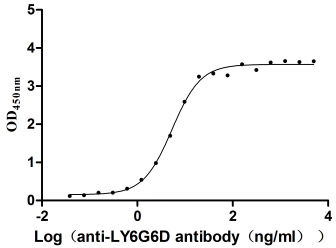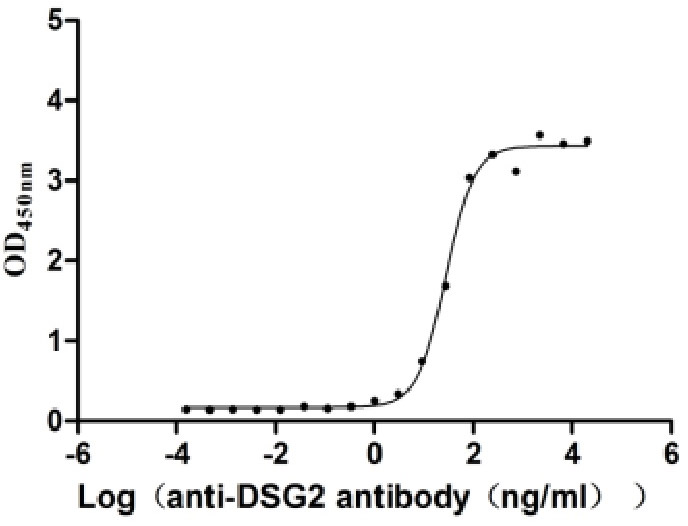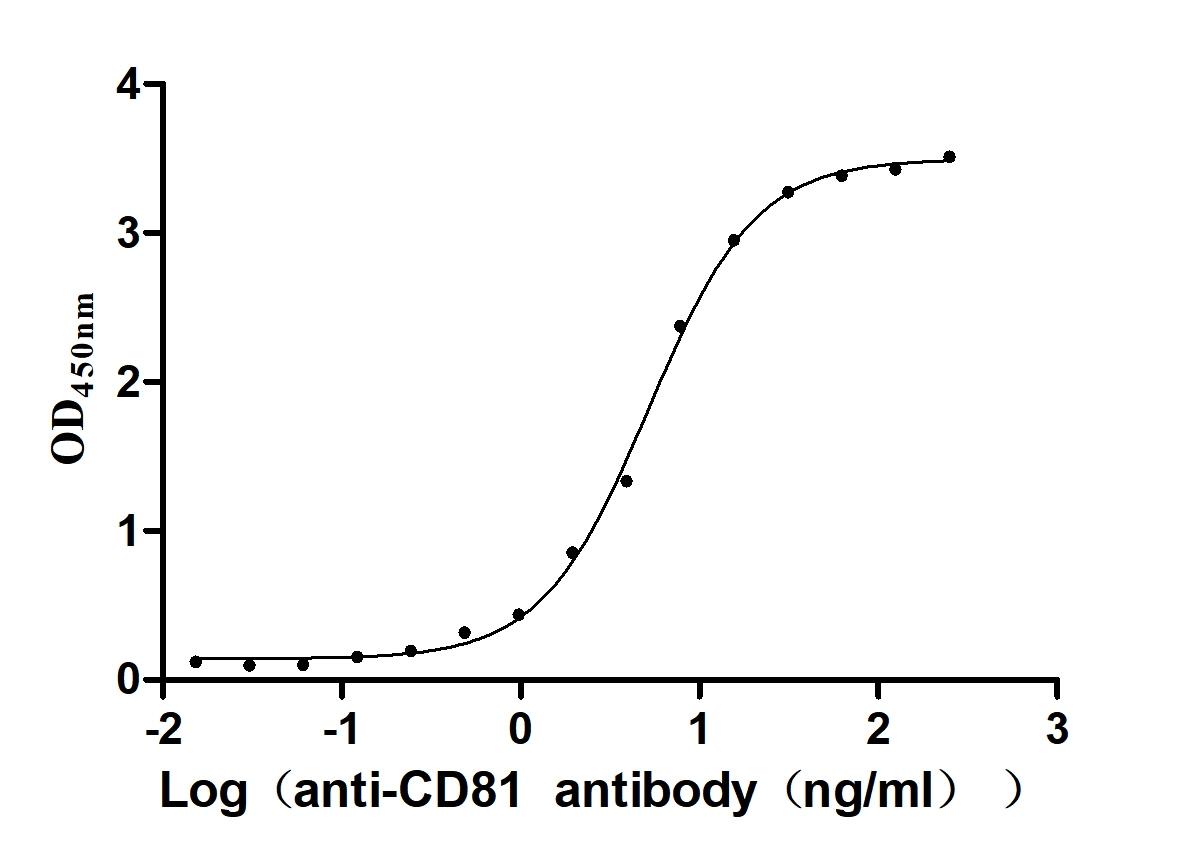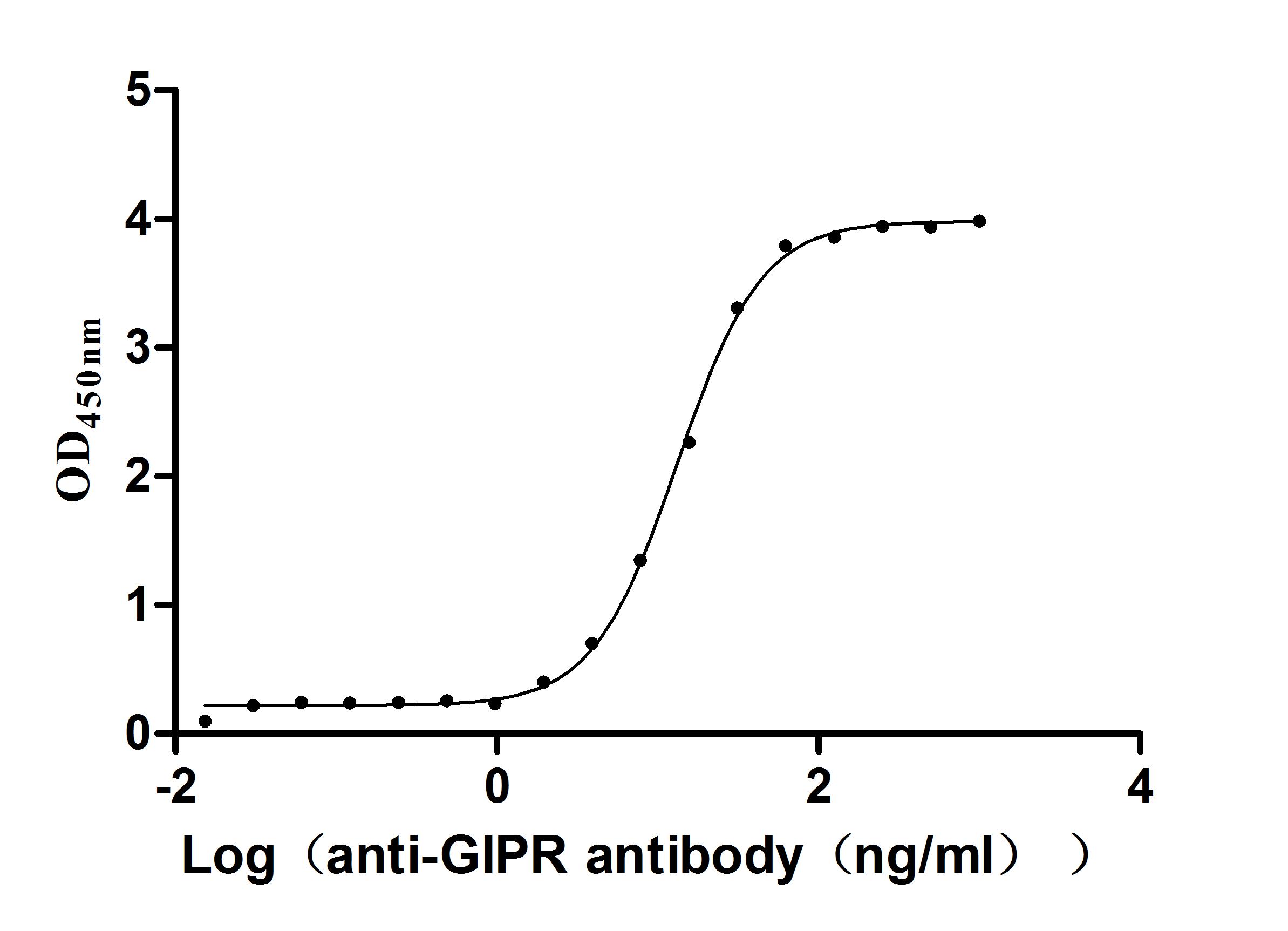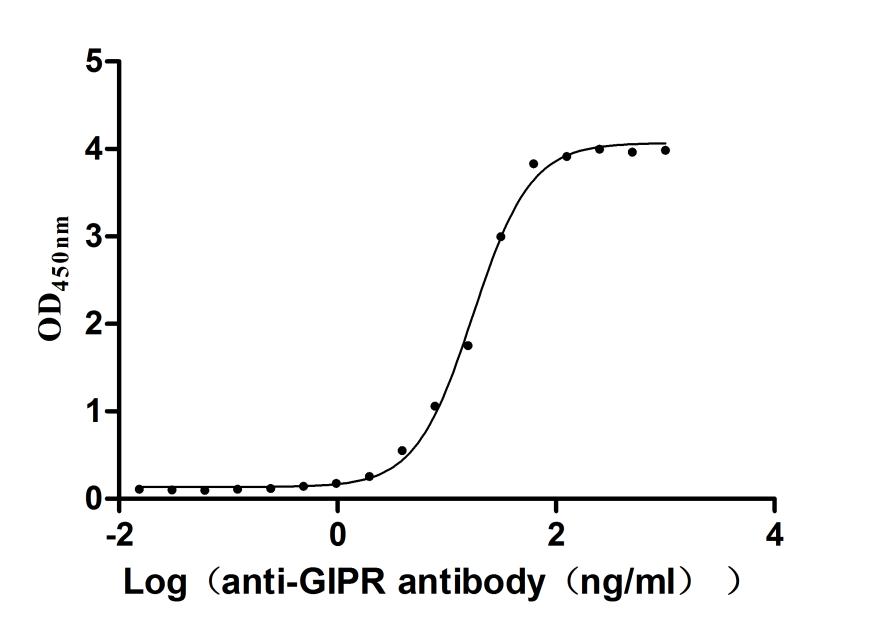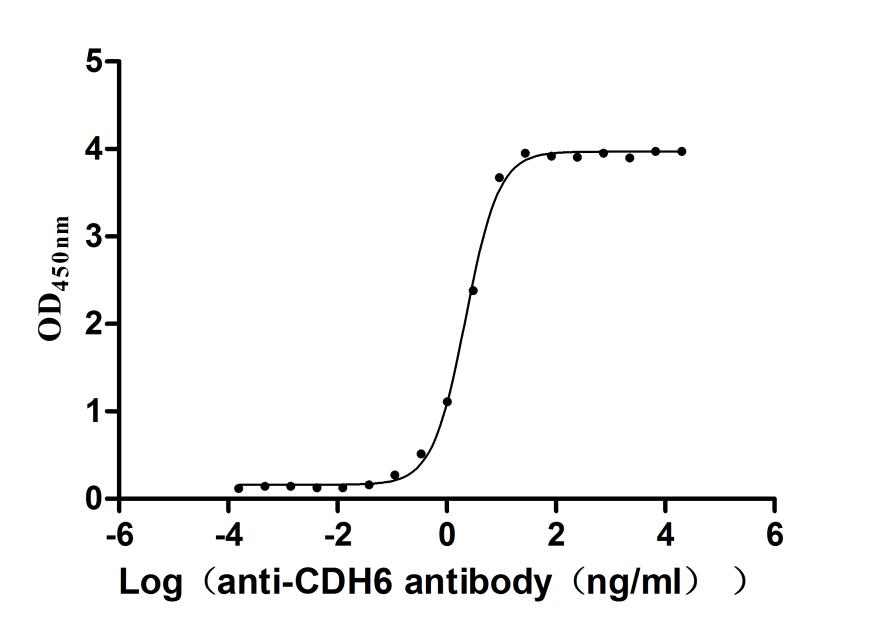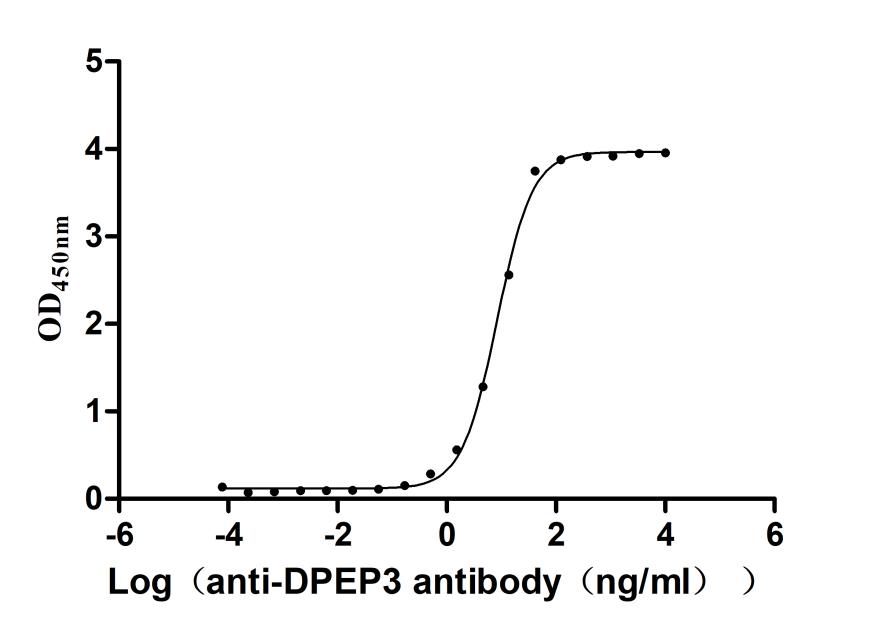Recombinant Mouse Transcription factor GATA-6 (Gata6)
-
中文名称:小鼠Gata6重组蛋白
-
货号:CSB-YP723401MO
-
规格:
-
来源:Yeast
-
其他:
-
中文名称:小鼠Gata6重组蛋白
-
货号:CSB-EP723401MO
-
规格:
-
来源:E.coli
-
其他:
-
中文名称:小鼠Gata6重组蛋白
-
货号:CSB-EP723401MO-B
-
规格:
-
来源:E.coli
-
共轭:Avi-tag Biotinylated
E. coli biotin ligase (BirA) is highly specific in covalently attaching biotin to the 15 amino acid AviTag peptide. This recombinant protein was biotinylated in vivo by AviTag-BirA technology, which method is BriA catalyzes amide linkage between the biotin and the specific lysine of the AviTag.
-
其他:
-
中文名称:小鼠Gata6重组蛋白
-
货号:CSB-BP723401MO
-
规格:
-
来源:Baculovirus
-
其他:
-
中文名称:小鼠Gata6重组蛋白
-
货号:CSB-MP723401MO
-
规格:
-
来源:Mammalian cell
-
其他:
产品详情
-
纯度:>85% (SDS-PAGE)
-
基因名:Gata6
-
Uniprot No.:
-
别名:Gata6; Transcription factor GATA-6; GATA-binding factor 6
-
种属:Mus musculus (Mouse)
-
蛋白长度:full length protein
-
表达区域:1-589
-
氨基酸序列MALTDGGWCL PKRFGAAAAD AGDSGPFPAR EPSSPLSPIS SSSSSCSRGG DRGPCGASNC RTPQLDAEAV AGPPGRSLLL SPYASHPFAA AHGAAAPGVA GPGSALSTWE DLLLFTDLDQ AATASKLLWS SRGAKLSPFA AEQPEEMYQT LAALSSQGPA AYDGAPGGFV HSAAAAAAAA AAASSPVYVP TTRVGSMLSG LPYLQGAGSG PSNHAGGAGA HPGWSQASAD SPPYGGGGAA GGGAAGPGGA GSATAHASAR FPYSPSPPMA NGAARDPGGY VAAGGTGAGS VSGGGGSLAA MGGREHQYSS LSAARPLNGT YHHHHHHHPT YSPYMAAPLT PAWPAGPFET PVLHSLQGRA GAPLPVPRGP STDLLEDLSE SRECVNCGSI QTPLWRRDGT GHYLCNACGL YSKMNGLSRP LIKPQKRVPS SRRLGLSCAN CHTTTTTLWR RNAEGEPVCN ACGLYMKLHG VPRPLAMKKE GIQTRKRKPK NINKSKACSG NSSGSVPMTP TSSSSNSDDC TKNTSPSTQA TTSGVGASVM SAVGENANPE NSDLKYSGQD GLYIGVSLSS PAEVTSSVRQ DSWCALALA
-
蛋白标签:Tag type will be determined during the manufacturing process.
The tag type will be determined during production process. If you have specified tag type, please tell us and we will develop the specified tag preferentially. -
产品提供形式:Lyophilized powder
Note: We will preferentially ship the format that we have in stock, however, if you have any special requirement for the format, please remark your requirement when placing the order, we will prepare according to your demand. -
复溶:We recommend that this vial be briefly centrifuged prior to opening to bring the contents to the bottom. Please reconstitute protein in deionized sterile water to a concentration of 0.1-1.0 mg/mL.We recommend to add 5-50% of glycerol (final concentration) and aliquot for long-term storage at -20℃/-80℃. Our default final concentration of glycerol is 50%. Customers could use it as reference.
-
储存条件:Store at -20°C/-80°C upon receipt, aliquoting is necessary for mutiple use. Avoid repeated freeze-thaw cycles.
-
保质期:The shelf life is related to many factors, storage state, buffer ingredients, storage temperature and the stability of the protein itself.
Generally, the shelf life of liquid form is 6 months at -20°C/-80°C. The shelf life of lyophilized form is 12 months at -20°C/-80°C. -
货期:Delivery time may differ from different purchasing way or location, please kindly consult your local distributors for specific delivery time.Note: All of our proteins are default shipped with normal blue ice packs, if you request to ship with dry ice, please communicate with us in advance and extra fees will be charged.
-
注意事项:Repeated freezing and thawing is not recommended. Store working aliquots at 4°C for up to one week.
-
Datasheet :Please contact us to get it.
靶点详情
-
功能:Transcriptional activator that regulates SEMA3C and PLXNA2. May regulate genes that protect epithelial cells from bacterial infection. Involved in gene regulation specifically in the gastric epithelium. Involved in bone morphogenetic protein (BMP)-mediated cardiac-specific gene expression. Binds to BMP response element (BMPRE) DNA sequences within cardiac activating regions.
-
基因功能参考文献:
- The long non-coding antisense transcript of GATA6 (GATA6-AS) interacts with the epigenetic regulator LOXL2 to regulate endothelial gene expression via changes in histone methylation. A number of angiogenesis- and hypoxia-related genes were downregulated by GATA6-AS silencing. Silencing of GATA6-AS diminishes TGF-beta2-induced endothelial-mesenchymal transition in vitro and promotes formation of blood vessels in mice. PMID: 29339785
- Gata6 could be utilized as a biomarker to select the best Pluripotent stem cell (PSC) lines to produce PSC-derived cardiomyocytes. PMID: 29335067
- Phosphorylation of GATA6 by Erk1/2 compels exit from pluripotent state, and the phosphorylation propels a GATA6 positive feedback regulatory circuit to compel primitive endoderm differentiation PMID: 29454706
- These findings identify Gata6-directed differentiation of neural crest to vascular smooth muscle cells as an essential mechanism that specifies the aortic tree, and provide a new framework for how mutations in GATA6 lead to congenital heart disorders in humans. PMID: 28952437
- Data (including data from studies in knockout mice and transgenic mice) suggest that pancreatic islets in adult mice deficient in GATA6 activity exhibit decreased insulin content and impaired insulin secretion. Gata6-deficient mice are apparently normal at birth; as they age they develop glucose intolerance. PMID: 29263149
- results support a model in which Gata6 contributes to repression of Isl1 expression in the anterior of nascent hindlimb buds. PMID: 29197504
- During wound healing differentiated Gata6(+) cells migrate from the sebaceous duct into the interfollicular epidermis and dedifferentiate, acquiring the ability to undergo long-term self-renewal and differentiate into a much wider range of epidermal lineages than in undamaged tissue. PMID: 28504705
- The s find that Gata6 protects against DNA damage associated with proliferation, thus preventing cell cycle arrest and apoptosis. PMID: 27908934
- Findings indicate that the Gata6 promoter is activated by Esrrb in association with Ncoa3, and Dax1 inhibited activities of Esrrb and Ncoa3, resulting maintenance of the undifferentiated status of embryonic stem (ES) cells. PMID: 27601327
- In the pancreas, Gata6 acts as a tumour suppressor by enforcing acinar cell differentiation, by directly and indirectly repressing ectopic differentiation programmes, and by regulating crucial cancer-related gene expression pathways. PMID: 25596178
- Our results, for the first time, portray a pivotal role of GATA6 in regulating metastatic behaviors of breast cancer cells PMID: 26505174
- data indicated that GATA-6 and Akt2 are involved in the mTORC1-mediated regulation of VSMC proliferation and differentiation. PMID: 25969542
- GATA6 contributes to the development and postnatal function of the murine atrioventricular node by promoting cell-cycle exit of specified cardiomyocytes toward a conduction system lineage. PMID: 25613430
- Gata6 is a versatile and potent reprograming factor that can act alone to drive a cell fate switch from diverse cell types PMID: 26109048
- Mice with double deletion of Gata4 and Gata6 lack identifiable adrenal glands. Inactivation of Gata6 alone drastically reduced the adrenal size and corticosterone production in the adult animals. PMID: 25933105
- These results establish SHP as a novel antihypertrophic regulator that acts by interfering with GATA6 signaling. PMID: 25015078
- In KRAS-mutant mice, nicotine promotes pancreatic carcinogenesis and tumor development via down-regulation of Gata6 to induce acinar cell dedifferentiation. PMID: 25127677
- In the absence of Gata6, all inner-cell-mass cells adopt an epiblast identity. PMID: 25209243
- Gata6 is expressed in proximal airway epithelium throughout lung development. PMID: 24970044
- Gata6 regulates differentiation, metabolism, and survival of resident peritoneal macrophages through aspartoacylase. PMID: 25024137
- GATA6 creates an environment permissive for CRC initiation by lowering the threshold of BMP signalling required for tumour stem cell expansion PMID: 24952462
- Gata6 mutants exhibit a complete absence of primitive endoderm and GATA6 levels regulate the timing and speed of lineage commitment within the inner cell mass. PMID: 24835466
- Study identified retinoic acid as a signal that induces tissue-specific localization and functional polarization of peritoneal macrophages through the reversible induction of transcription factor GATA6. PMID: 24792964
- Piceatannol inhibits the development of cardiac hypertrophy through regulation of the expression and activity of transcriptional factor GATA6. PMID: 24662306
- conditional loss of Shh in limb buds lacking GATA6 prevents development of hindlimb polydactyly in these compound mutant embryos. PMID: 24415953
- Selective deficiency of Gata6 in myeloid cells caused substantial alterations in the transcriptome of peritoneal macrophages. Gata6 deficiency also resulted in dysregulated peritoneal macrophage proliferative renewal during homeostasis and in response to inflammation, which was associated with delays in the resolution of inflammation. PMID: 24762537
- Gata6 is required for complete acinar differentiation and maintenance of the exocrine pancreas in adult mice. PMID: 23002247
- GATA6 regulates the differentiation of steroidogenic progenitors into adrenocortical cells. PMID: 23471215
- GATA6 and FOXA2 bind the Wnt6 promoter and regulate its activity, leading to primitive endoderm formation. PMID: 22607194
- The study characterized the CPI-17 promoter and identified binding sites for GATA-6 and nuclear factor kappa B (NF-kappaB). PMID: 23275439
- Loss of Gata6 in the pancreas caused mild pancreatic defects. Loss of both Gata4 & Gata6 caused pancreatic agenesis, disrupted progenitor cell proliferation, disturbed branching morphogenesis, & failed to induce CPA1+/NEUROG3+ progenitor cells. PMID: 23006325
- Double Gata4/Gata6 mutants failed to develop pancreata, died shortly after birth, & displayed hyperglycemia. Loss of only 1 Gata6 allele on a Gata4 conditional knockout background severely reduced pancreatic mass. PMID: 23006330
- In the colon, Gata6 deletion resulted in shorter, wider crypts, a decrease in proliferation, and a delayed crypt-to-surface epithelial migration rate. PMID: 22733991
- These results demonstrate that GATA-4 and GATA-6 are needed for normal ovarian function. PMID: 22434075
- Post-transcriptional repression of Gata6 expression by Unr contributes to the stabilization of the embryonic stem cells pluripotent state. PMID: 21954113
- Reveal a previously uncharacterized phenotypic heterogeneity in the myocardium and suggest that decreased gap junctional coupling leads to induction of a signaling pathway that utilizes a unique GATA6 enhancer. PMID: 21908788
- Muc5b is a target gene of transcription factors (TTF-1, GATA-6) involved in lung differentiation programs during development and carcinogenesis. TTF-1 is a strong repressor of Muc5b. PMID: 21126317
- The results suggest that GATA6 is downstream of Grb2 in the inductive signaling pathway and the expression of GATA6 is sufficient to compensate for the defects caused by Grb2 deficiency in the development of the primitive and extraembryonic endoderm. PMID: 20925113
- GATA6 plays a crucial role for endothelial cell function and survival, at least in part, by suppressing autocrine TGFbeta expression and ALK5-dependent signaling. PMID: 21127043
- Results suggest that alterations in gene expression of Gata6, Tspan8, S100a8, and Lmo2 may act via novel pathways that play functionally important roles in Men1-associated tumor progression. PMID: 20531244
- GATA-6 is both necessary and sufficient for regulating the cardiac hypertrophic response and differentiated gene expression, both alone and in coordination with GATA-4 PMID: 20705924
- Wnt2 works in a feedforward transcriptional loop with Gata6 to regulate posterior cardiac development. PMID: 20159597
- role in regulating WNT7b promoter PMID: 11914369
- GATA6 regulates differentiation of distal lung epithelium. PMID: 11959831
- GATA-6 can act as a positive or negative regulator of smooth muscle-specific gene expression PMID: 15550397
- GATA-6 regulates a set of genes associated with vascular smooth muscle synthetic functions. GATA-6 regulates multiple genes involved in cell-cell signaling & cell-matrix interactions, as well as endothelin-1 & the AT1a receptor genes. PMID: 15591218
- GATA6 alone is available for liver bud growth and commitment of the endoderm to a hepatic cell fate PMID: 15767668
- GATA-6 is required to sense morphogenic (retinoic acid) signal; collaboration between GATA-6 and GATA-4, or GATA-6 and GATA-5 is involved in the perception of differentiation cues by embryonic stem cells in their determination of endoderm lineage PMID: 16162334
- Expression of LMCD1/dyxin is remarkably similar to that of GATA6, with high-level expression observed in distal airway epithelium of the lung, vascular smooth muscle, and myocardium. PMID: 16199866
- Data show that Hop is expressed in airway epithelium coincident with HDAC2, and acts downstream of Nkx2.1 and GATA6, to negatively regulate surfactant protein expression. PMID: 16510470
显示更多
收起更多
-
亚细胞定位:Nucleus.
-
组织特异性:Expressed in myocardium, vascular smooth muscle, gut epithelium, and osteoclasts.
-
数据库链接:
KEGG: mmu:14465
STRING: 10090.ENSMUSP00000041774
UniGene: Mm.329287
Most popular with customers
-
Recombinant Human Poliovirus receptor (PVR) (I340M), partial (Active)
Express system: Mammalian cell
Species: Homo sapiens (Human)
-
Recombinant Macaca fascicularis lymphocyte antigen 6 family member G6D (LY6G6D) (Active)
Express system: Yeast
Species: Macaca fascicularis (Crab-eating macaque) (Cynomolgus monkey)
-
Recombinant Human Desmoglein-2 (DSG2), partial (Active)
Express system: Mammalian cell
Species: Homo sapiens (Human)
-
Recombinant Human CD81 antigen (CD81), partial (Active)
Express system: Mammalian cell
Species: Homo sapiens (Human)
-
Recombinant Macaca fascicularis Gastric inhibitory polypeptide receptor (GIPR), partial (Active)
Express system: yeast
Species: Macaca fascicularis (Crab-eating macaque) (Cynomolgus monkey)
-
Recombinant Human Gastric inhibitory polypeptide receptor(GIPR),partial (Active)
Express system: Mammalian cell
Species: Homo sapiens (Human)
-
Recombinant Macaca fascicularis Cadherin 6(CDH6),partial (Active)
Express system: Mammalian cell
Species: Macaca fascicularis (Crab-eating macaque) (Cynomolgus monkey)
-
Recombinant Macaca fascicularis Dipeptidase 3(DPEP3) (Active)
Express system: Mammalian cell
Species: Macaca fascicularis (Crab-eating macaque) (Cynomolgus monkey)


-AC1.jpg)
